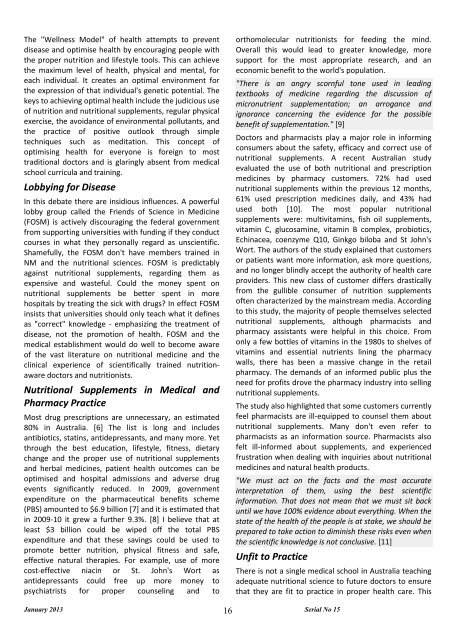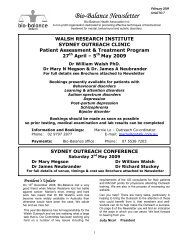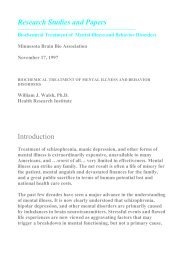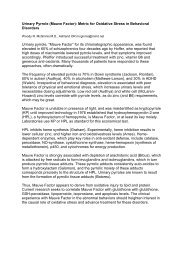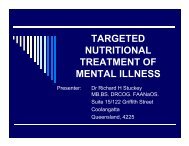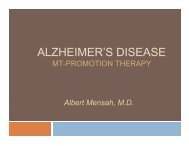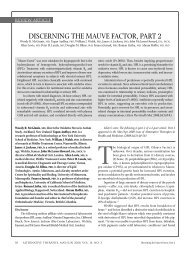Download PDF - Bio-Balance Health
Download PDF - Bio-Balance Health
Download PDF - Bio-Balance Health
- No tags were found...
Create successful ePaper yourself
Turn your PDF publications into a flip-book with our unique Google optimized e-Paper software.
The "Wellness Model" of health attempts to preventdisease and optimise health by encouraging people withthe proper nutrition and lifestyle tools. This can achievethe maximum level of health, physical and mental, foreach individual. It creates an optimal environment forthe expression of that individual's genetic potential. Thekeys to achieving optimal health include the judicious useof nutrition and nutritional supplements, regular physicalexercise, the avoidance of environmental pollutants, andthe practice of positive outlook through simpletechniques such as meditation. This concept ofoptimising health for everyone is foreign to mosttraditional doctors and is glaringly absent from medicalschool curricula and training.Lobbying for DiseaseIn this debate there are insidious influences. A powerfullobby group called the Friends of Science in Medicine(FOSM) is actively discouraging the federal governmentfrom supporting universities with funding if they conductcourses in what they personally regard as unscientific.Shamefully, the FOSM don't have members trained inNM and the nutritional sciences. FOSM is predictablyagainst nutritional supplements, regarding them asexpensive and wasteful. Could the money spent onnutritional supplements be better spent in morehospitals by treating the sick with drugs? In effect FOSMinsists that universities should only teach what it definesas "correct" knowledge - emphasizing the treatment ofdisease, not the promotion of health. FOSM and themedical establishment would do well to become awareof the vast literature on nutritional medicine and theclinical experience of scientifically trained nutritionawaredoctors and nutritionists.Nutritional Supplements in Medical andPharmacy PracticeMost drug prescriptions are unnecessary, an estimated80% in Australia. [6] The list is long and includesantibiotics, statins, antidepressants, and many more. Yetthrough the best education, lifestyle, fitness, dietarychange and the proper use of nutritional supplementsand herbal medicines, patient health outcomes can beoptimised and hospital admissions and adverse drugevents significantly reduced. In 2009, governmentexpenditure on the pharmaceutical benefits scheme(PBS) amounted to $6.9 billion [7] and it is estimated thatin 2009-10 it grew a further 9.3%. [8] I believe that atleast $3 billion could be wiped off the total PBSexpenditure and that these savings could be used topromote better nutrition, physical fitness and safe,effective natural therapies. For example, use of morecost-effective niacin or St. John's Wort asantidepressants could free up more money topsychiatrists for proper counseling and toorthomolecular nutritionists for feeding the mind.Overall this would lead to greater knowledge, moresupport for the most appropriate research, and aneconomic benefit to the world's population."There is an angry scornful tone used in leadingtextbooks of medicine regarding the discussion ofmicronutrient supplementation; an arrogance andignorance concerning the evidence for the possiblebenefit of supplementation." [9]Doctors and pharmacists play a major role in informingconsumers about the safety, efficacy and correct use ofnutritional supplements. A recent Australian studyevaluated the use of both nutritional and prescriptionmedicines by pharmacy customers. 72% had usednutritional supplements within the previous 12 months,61% used prescription medicines daily, and 43% hadused both [10]. The most popular nutritionalsupplements were: multivitamins, fish oil supplements,vitamin C, glucosamine, vitamin B complex, probiotics,Echinacea, coenzyme Q10, Ginkgo biloba and St John'sWort. The authors of the study explained that customersor patients want more information, ask more questions,and no longer blindly accept the authority of health careproviders. This new class of customer differs drasticallyfrom the gullible consumer of nutrition supplementsoften characterized by the mainstream media. Accordingto this study, the majority of people themselves selectednutritional supplements, although pharmacists andpharmacy assistants were helpful in this choice. Fromonly a few bottles of vitamins in the 1980s to shelves ofvitamins and essential nutrients lining the pharmacywalls, there has been a massive change in the retailpharmacy. The demands of an informed public plus theneed for profits drove the pharmacy industry into sellingnutritional supplements.The study also highlighted that some customers currentlyfeel pharmacists are ill-equipped to counsel them aboutnutritional supplements. Many don't even refer topharmacists as an information source. Pharmacists alsofelt ill-informed about supplements, and experiencedfrustration when dealing with inquiries about nutritionalmedicines and natural health products."We must act on the facts and the most accurateinterpretation of them, using the best scientificinformation. That does not mean that we must sit backuntil we have 100% evidence about everything. When thestate of the health of the people is at stake, we should beprepared to take action to diminish these risks even whenthe scientific knowledge is not conclusive. [11]Unfit to PracticeThere is not a single medical school in Australia teachingadequate nutritional science to future doctors to ensurethat they are fit to practice in proper health care. ThisJanuary 2013 16Serial No 15


